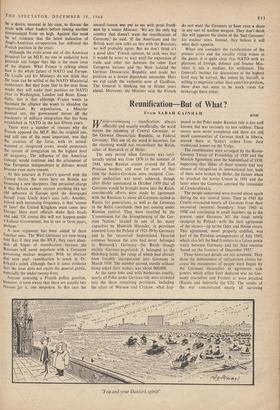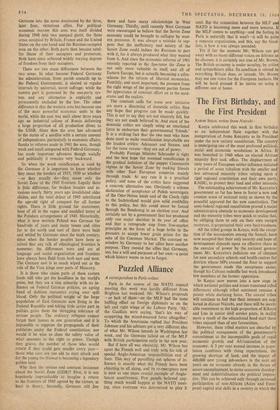Reunification—But of What ?
From SARAH GAINHAM
BONN
W
eider•vereinigung — reunification; alwaya
officially and usually unofficially, the word means the rejoining of Central Germany, or the German Democratic Republic, to Federal Germany. This use of, the word is incorrect, for the rejoining would not reconstitute the Reich, either' of Bismarck or of Hitler.
The only period when Germany was terri- torially united was from 1870 to the summer of 1944, when' Russian armies crossed the East Prussian borders, and even for most of that time the Austro-GermanS were excepted. Com- plete unification was never achieved, though after Hitler announced in October 1939 that all Germans'would be brought home into the Reich, considerable efforts were made by agreement, with the Russians to move all Germans settled in Russia for generations, as well as the Germans in the Baltic coastlands then just coming under Russian control. They were resettled by the 'Commission for the Strengthening of the Ger- man Nation,' headed in one of his many capacities by Heinrich Himmler, in provinces annexed from the Poland of 1921-39'by Germany and in the 'recovered' Sudetenland. Inverted commas because the area had never belonged to Bismarck's Germany—the Reich—though Mainly German-populated,; it belonged to the Habsburg lands, the rump of which had already been forcibly incorporated into Germany in March 1938. The number moved, mostly without being asked their wishes, was about 800,000.
At the same time and with barbarous cruelty, nearly all Poles under German rule were crowded into' the three remaining provinces, including the cities of Warsaw and Crakow; what hap-
pened to the Poles under Russian rule is less well known, but was certainly no less ruthless. These moves were never completed and there are still small communities of German stock in Siberia, moved there at Stalin's orders from their traditional homes on the Volga.
The resettlements were arranged by the Russo- German Treaty of Friendship of 1939' and the Munich Agreement over the Sudetenland of 1938. Supposing that either of these treaties had any chance of 'recognition in international law, both of them were broken by Hitler, the former when he attacked, the Soviet - Union in 1941 and the latter when the Germans annexed the remainder of Czechoslovakia.
The people concerned were moved about again during the war several times. Then in 1945 the Czechs evacuated nearly all Germans from their recovered (western) boundary; from 1945 to 1948'and continuing in small numbers up to the present, most Germans left the lands newly occupied by Poland—with the tacit agreement of the victors—hp to' the Oder and Neisse rivers. This agreement, never properly codified, was part of the Potsdam arrangements of July 1945,. which also leftthe final frontiers to a future peace treaty between Germany and her then enemies 'based on the frontiers of December 1937.'
These historical details are not academic. They show the dubiousness of reclamation claims be- cause the movements of people were begun by the Germans themselves in agreement with powers which either later declared war on Ger- many (ourselves and France) or were attacked (Russia and indirectly the US). The results of the war concentrated nearly all surviving
'You and your Dunkirk spirit!'
Germans into the areas dominated by the three, later four, victorious allies. For political- economic reasons this area was itself divided during 1948 into two unequal parts; the three areas occupied by Britain, France and the United States on the one hand and the Russian-occupied area on the other. Both parts then became satel- lite States of their occupiers and protectors. Both have since achieved widely varying degrees of freedom from their occupiers.
There are two main differences between the two areas. In what became Federal Germany the administration, from parish councils up to the Federal Government, is elected at regular intervals by universal, secret suffrage; while the eastern part is governed by the one-party sys- tem and any alternative is explicitly and permanently excluded by the law. The other difference is that the western area has become one of the most powerful economic units in the world, while the east was until about three years ago an industrial colony of Russia delivering a large proportion of all production direct to the USSR. Since then the area has advanced to the status of a satellite with a certain amount of independence, particularly in economic affairs; thanks to reforms made in 1961 the area, though weak and small compared with Federal Germany, has made important advances though socially and politically it remains very backward.
So when the word retinification is used by the Germans it is important to know whether they mean the borders of 1937, 1939 or whether —as they usually do—they mean only the Soviet Zone of the 1945 frontiers. Legally there is little difference, for broken treaties and in- vasions nearly thirty years ago invalidated older claims, and the total defeat of 1945 substituted the age-old right of conquest for all former rights. There is little ground for movement; least of all in the vague and muddled terms of the Potsdam arrangements of 1945. Historically, what is now western Poland was German for hundreds of years and many towns and cities far to the north and east of there were built and settled by Germans since the tenth century, since when the border peoples have been so mixed that any talk of ethnological frontiers is nonsense; the differences were and are of language and social organisation and frontiers have always been fluid from both east and west. The German east is as much wiped out as the rule of the Vasa kings over parts of Muscovy.
It is those who claim parts of these eastern lands still who get the headlines in the world's press; but they are a tiny minority with no in- fluence on Federal German policies, an ageing band of dubious romantics crying over spilt blood. Only the political weight of the large population of East Germans now living in the Federal Republic and taking little active part in politics gains them the shrugging tolerance of serious people. The ordinary refugees cannot forget their homes in one generation and it is impossible to suppress the propaganda of their publicists under the Federal constitution; nor would it be wise to close the safety valve of what amounts to the right to grieve. Though they grieve, the number of those who would return if they could gets smaller every year— those who care are too old to start afresh and for the young the Helmut is becoming a legendary golden land.
Why then the serious and constant insistence about the Soviet Zone (GDR)? First, it is not hopelessly impracticable to imagine a return to the frontiers of 1945 agreed by the victors, at least in theory. Secondly, Germans still live there and have many relationships in West Germany. Thirdly, until recently West Germans were encouraged to believe that the Soviet Zone economy could be brought to collapse by west- ern pressures. It was always a mistake to sup- pose that the inefficiency and misery of the Soviet Zone could induce the Russians to part with it, for it always produced what they wanted from it. And since the economic reforms of 1961 recently reported in the Spectator the Zone is not only more valuable to itself and all of Eastern Europe, but is actually becoming a pilot- scheme for the reform of Marxist economics. Fourthly, and most important, the pressure from the right wings of the government parties forces the appearance of constant effort on to the mod- erates and the realists.
The constant calls for some new initiative are more a disarming of domestic critics than any hope that progress can be made quickly. This is not to say they are not sincerely felt, but they are not much believed in. And most of the domestic critics are simply using an emotional force to embarrass their governmental 'friends.' It is a striking fact that the two men who have done most to make reunification improbable are the loudest critics; Adenauer and Strauss, and for the same reason—they are out of power.
Probably Foreign Minister Schroeder is right and the best hope for eventual reunification is the gradual isolation of the puppet Communist regime in the Soviet Zone by making friends with other East European countries mainly through trade. At any rate it is a practical policy, and none of the critics have suggested a concrete alternative one. Obviously a solemn declaration of acceptance of Polish sovereignty of the Oder-Neisse lands and of the Czech right to the Sudetenland would give solid credibility to this policy, but this could never be forced through the Bundestag in an election year. And certainly not by a government that has produced only one major decision in its year of office and that a retrograde step from free-market principles in the form of a huge bribe to the peasants to accept lower grain prices for the sake of the Common Market. The constant re- minders by Germany to her allies have another purpose. They remind the allies that Germany, too, has a will and purposes of her own—a point which history warns us not to forget.





























 Previous page
Previous page